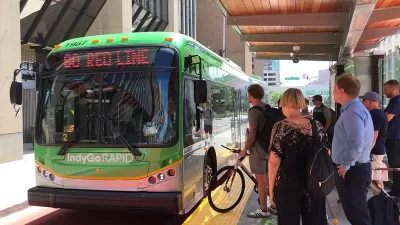It took awhile, but the city of Indianapolis has finally approved the nation's newest income tax to raise revenue for the IndyGo public transit system.

[Updated March 1, 2017] "The Marion County transit system is getting its first major expansion," reports James Briggs.
The City-County Council on Monday approved a 0.25 percent income tax hike that will pump more than $54 million a year into the county's meager bus service. The money will pay for the construction of three bus rapid transit lines, new buses, increased route frequency and new sidewalks and bus shelters.
The transit tax was closely watched by transit advocates around the country, as well as locals, for its unique method of raising revenue and its approval process. Planetizen readers will recall that Marion County voters overwhelmingly supported the income tax for transit, by approving Question 2 in the November 2016 election. The Indianapolis City-County Council delayed action on the results of that vote until yesterday. According to Briggs, the tax took years to approve, moving through layers of bureaucracy at the state and county levels, before finally gaining the approval of the Indianapolis City-County Council.
Now that the whole process is said and done, the income tax hike will take effect in October, explains Briggs, "costing Marion County residents about $100 per $40,000 of income."
[An earlier version of this article incorrectly described the Indianapolis transit tax as the first of its kind. Cincinnati has a 0.3 percent earnings tax that funds transit.]
FULL STORY: Indy council approves transit tax

Planetizen Federal Action Tracker
A weekly monitor of how Trump’s orders and actions are impacting planners and planning in America.

Maui's Vacation Rental Debate Turns Ugly
Verbal attacks, misinformation campaigns and fistfights plague a high-stakes debate to convert thousands of vacation rentals into long-term housing.

San Francisco Suspends Traffic Calming Amidst Record Deaths
Citing “a challenging fiscal landscape,” the city will cease the program on the heels of 42 traffic deaths, including 24 pedestrians.

Amtrak Rolls Out New Orleans to Alabama “Mardi Gras” Train
The new service will operate morning and evening departures between Mobile and New Orleans.

The Subversive Car-Free Guide to Trump's Great American Road Trip
Car-free ways to access Chicagoland’s best tourist attractions.

San Antonio and Austin are Fusing Into one Massive Megaregion
The region spanning the two central Texas cities is growing fast, posing challenges for local infrastructure and water supplies.
Urban Design for Planners 1: Software Tools
This six-course series explores essential urban design concepts using open source software and equips planners with the tools they need to participate fully in the urban design process.
Planning for Universal Design
Learn the tools for implementing Universal Design in planning regulations.
Heyer Gruel & Associates PA
JM Goldson LLC
Custer County Colorado
City of Camden Redevelopment Agency
City of Astoria
Transportation Research & Education Center (TREC) at Portland State University
Jefferson Parish Government
Camden Redevelopment Agency
City of Claremont





























